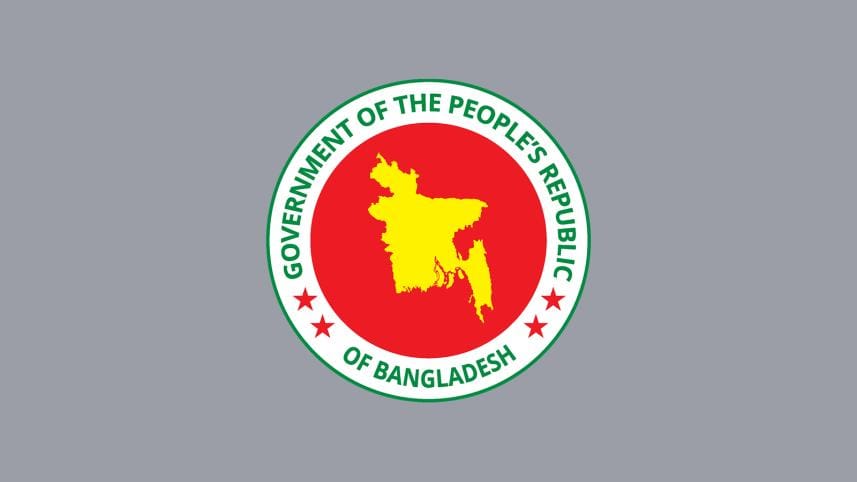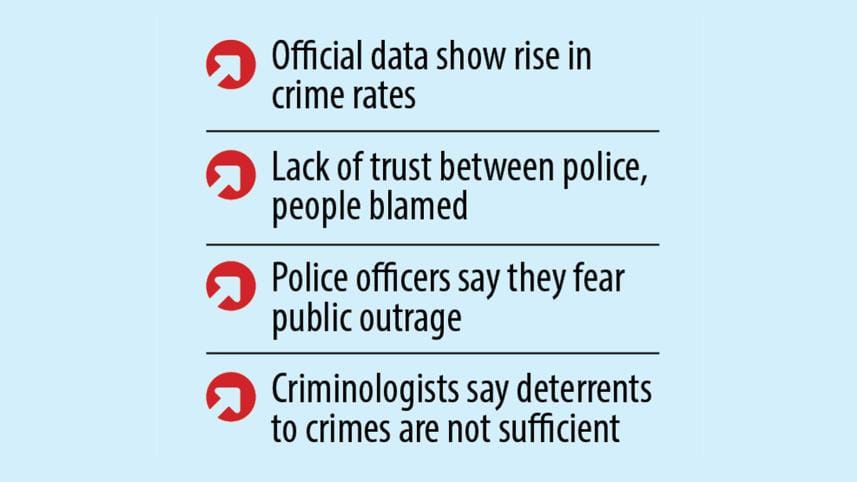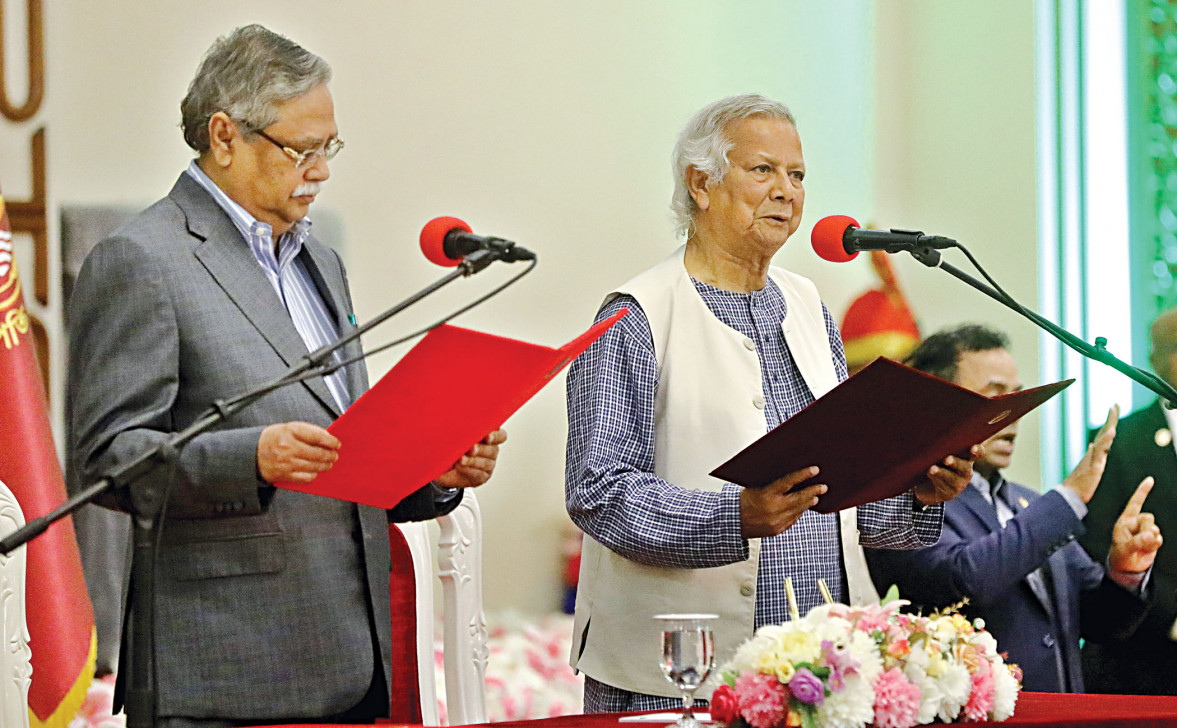6 months of interim govt: Citizens still in fear for safety

The law and order situation remains a huge concern six months after the interim government assumed office, with incidents of mugging, extortion, and even murder continuing to occur.
Many citizens feel unprotected and vulnerable since law enforcement agencies, particularly the police, have not been able to regain control despite arresting a significant number of suspected criminals, including muggers and extortionists.

In parts of Dhaka, residents are afraid of venturing out after dark as machete-wielding muggers targeting people in broad daylight have made headlines several times in recent months.
Tanvir Islam, a software engineer, said he was mugged two times in the Mohammadpur area — once in September last year and again in January this year.
"I don't feel safe after dark any more. In fact, no hour is safe in Mohammadpur. People are not only being robbed, but also stabbed and hacked," he said.
Meanwhile, law enforcers' inability to control large crowds was evident during the demolition of Bangabandhu Sheikh Mujibur Rahman's residence in Dhanmondi and structures linked to the Awami League and its leaders across the country.
Official data also show a rise in the rate of crimes.
Between September and December 2024, police reported a significant increase in dacoity, with 243 cases filed, up from 98 during the same period in 2023.
In these four months, 553 robbery incidents were recorded, along with 302 kidnappings and 949 burglaries, compared to 396 robberies, 160 kidnappings, and 859 burglaries during the same period of the previous year.
The number of murder cases in these months last year stood at 947, just slightly down from 956 in the same months of 2023.
Deaths resulting from mob beatings saw a sharp rise, with 128 fatalities recorded in 2024, including 96 from August to December. The number of such deaths in 2023 was 51.
Many incidents of attacks on Sufi establishments were also reported. On January 23, the Global Sufi Organisation held a press conference alleging that over 80 mazars (shrines) and darbar sharifs (Sufi centres) were attacked by extremist groups across the country in the past six months. The government also confirmed that at least 40 such sites had been targeted in 44 separate attacks since August 4.
Yet, little action has been taken against the perpetrators.
The release of some top criminals after the political changeover last year, followed by a rise in reports of extortion, fuelled concerns over crimes in the city, said police officers and victims.
For instance, in November 2024, a contractor had to pay Tk 3 lakh to local gangs linked to top listed criminals to continue the Tk 16.5 lakh demolition work on a building in Dhaka's Moghbazar.
In January, top criminal Imamul Hasan Helal alias Pichchi Helal's brother Wahedul Hasan Dipu was among two computer traders who were hacked allegedly by another top criminal Sanjidul Hassan Emon's gang on Elephant Road for refusing to pay extortion money, according to the case statement filed over the incident.
Helal was previously named in a murder case filed at Mohammadpur Police Station on September 21, 2024, shortly after his release from jail.
With a good number of similar incidents reported in recent months, a climate of fear permeates the business community of Dhaka. Contractors in the construction sector are being forced to pay or stop work under threat, while businesspeople in other sectors are targeted with abduction or attacks.
CCTV footage has shown criminals firing near an under-construction building in the capital's Hazaribagh area, apparently to intimidate the builder.
An automobile businessman from Beribadh, Mohammadpur, told these correspondents that he has never faced such a situation in his 30 years of business. Criminals extorted Tk 10 lakh from him after August 5 and demanded more, he alleged.
"Muggers have been attacking people openly in the Rayerbazar and Beribadh areas and fleeing through the nearby graveyard. After seeing some incidents with my own eyes, I now fear to move alone," said the businessman.
Petty criminals have also become more reckless, carrying out muggings on roads and alleys with machetes, even in broad daylight in several parts of the capital. Many videos of such incidents are circulating on social media.
In Mohammadpur, The Daily Star spoke with seven victims of mugging incidents that took place last month. Six of them chose to file general diaries, citing these as loss of valuables, instead of cases as they fear legal complications. One victim opted not to file a complaint at all.
City residents wonder why such crimes continue even after six months under the current government, which deployed joint forces, including members of the armed forces, across the country to maintain law and order.
Criminologists say that criminals perceive the current environment as favourable for carrying out illicit activities, given the demoralised state of the police and other law enforcement agencies.
Omar Faruk, a professor at the Department of Criminology and Police Science at Mawlana Bhashani Science and Technology University, said the deterrents to crimes were no longer sufficient because the criminals believed they would not face significant consequences.
"This lack of fear among the criminals has emboldened them further," Prof Faruk said.
"From the start, there was a lack of trust between the police and the public. Now it has deepened into a crisis of trust on both sides."
Many officers are not actively participating in their duties, and there is a noticeable lack of motivation within the force, Prof Faruk said.
Moreover, arms and ammunition looted during the uprisings have fallen into the hands of criminals. As a result, the severity of crimes has increased, Faruk added.
The Daily Star talked to several police officers about the persisting lack of morale within the force.
The officer-in-charge of a police station in the capital, who wished to be anonymous, said that people no longer fear the police. Even for trivial reasons, they behave aggressively toward law enforcers. As a result, many officers are reluctant to go on patrol.
A traffic constable from Dhaka Metropolitan Police's Ramna Division said that some traffic violators often refer to the "blood on the hands of the police" when the police try to penalise them.
Another police officer said, "We accepted that no cases were filed over the deaths and injuries of police personnel during the July protests or on August 5. But in Chattogram, an OC was publicly attacked and beaten in broad daylight in front of hundreds of people. The video of the incident spread on social media, yet no case was filed against anyone. This is disheartening."
Police officers said that the police themselves still feel insecure. As a result, they are reluctant to go on patrol or conduct searches. Many officers are unwilling to take risks during investigations or arrest operations.
Inspector General of Police (IGP) Baharul Alam earlier said that they were working to help the force regain confidence.
Before the uprising, he said, the police had become a tool of a "fascist government", leading to widespread public anger against them.
"The current challenge is to structure the police effectively, make them acceptable to the public and ensure that they never revert to an anti-people stance," he added.
Home Adviser Lt Gen (retd) Jahangir Alam Chowdhury recently told reporters that the government was not 100 percent satisfied with law and order, but efforts were underway to improve it.





 For all latest news, follow The Daily Star's Google News channel.
For all latest news, follow The Daily Star's Google News channel. 
Comments